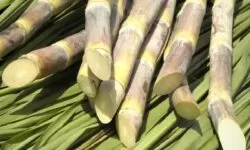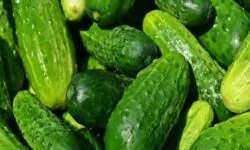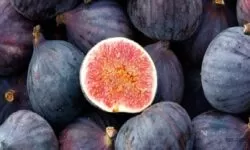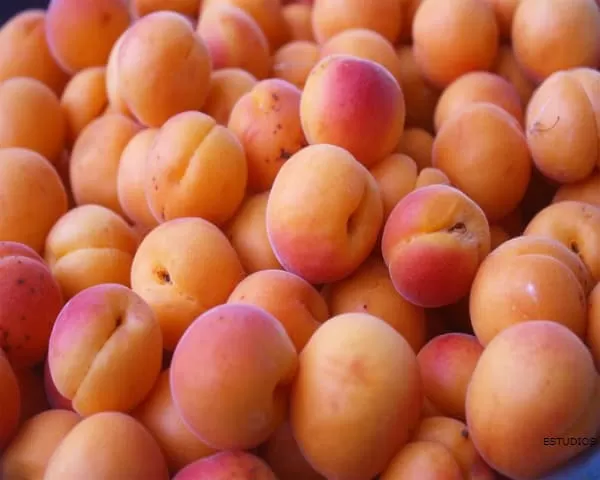The apricot pulp is not juicy, but nevertheless has certain fibrous textures, and in some cases, with a floury consistency when it is completely ripe. Normally, it is consumed when it is extremely fresh, although in most cases, this wonderful fruit is used to make jams, marmalades, compotes, among others. Apricots have laxative properties, so they are ideal for home remedies against diarrhea. The apricot increases the defenses of the human organism, and normally, it is a fruit that they recommend frequently for people who suffer from depression, delay of growth, stress, among other situations of the day to day.
The apricot, like many other fruits, belongs to the family of Rosaceae; its shape tends to be generally somewhat spherical, although on many occasions it comes in a flattened form, with approximately 3 centimeters in diameter. This wonderful fruit is also known as albérchigo, often resembling the appearance of a peach but being a little smaller.
Inside the apricot there is a seed, which has the shape of an almond, covered with a woody bark, extremely hard, although in many occasions it has an endocarp, from where the flesh is detached. This seed is not edible, however, its flavor tends to be totally bitter, and in many crops or varieties, this seed turns out to be poisonous and lethal for the person who tastes it.
The apricot belongs to the classification of citric or acid fruits, in the same way, it fits inside the fruits that provide the human body with vitamins A, B, C and D, also, it is a fruit that is in charge of supplying the organism with potassium, low levels of magnesium and calcium, and it is considered an orange fruit, an antioxidant fruit and a fruit with high levels of fiber.
Origin of the Apricot
Within the history of the apricot, this one goes back in temperate zones, specifically in the Asian continent, just in North Korea or Manchuria, nevertheless, it is said that the first sources of this culture give foot in Eastern China around almost 3000 B.C.
As a result of its discovery, different inhabitants of the area, began to disseminate and extend this fruit in their surroundings, reaching the hands of the Romans, who were responsible for bringing directly to the European continent the apricot, mainly to areas that today we know as Armenia, which is why in many cases, the apricot is known as prunus armeniaca.
Currently, there are many countries capable of producing this fruit, among which the United States, Greece, France, South Africa, Turkey, Spain, New Zealand, Switzerland, Brazil, among others, stand out. Also, at present, there are many crops and varieties of this wonderful fruit, so it can be found often in many times of the year.
Properties of the Apricot
Among the main nutritional properties of apricots you get the following:
- In comparison with other fruits, the energetic contribution of the apricot is extremely low, given its high composition of water, and modest contributions as far as carbohydrates are concerned. However, it is a fruit that stands out above the rest, for its high values in fiber, which help to improve significantly the intestinal transit. In addition, that is responsible for providing substances known to provitamin A or beta-carotene, which acts as an antioxidant function.
- On the other hand, its mineral content is not less important than other fruits, since it turns out to be a fruit rich in elements like potassium and iron, and a little less in magnesium and calcium, being this last one of worse use in people, since many times it is only ingested through the milky ones.
- The beta-carotene that is able to supply the human organism is transformed into vitamin A, according to what the organism needs constantly. This substance is essential for the good condition of the skin, for the mucous membranes, for the hair, for the vision and for the good functioning of the immune system in general.
Within the properties for the health of this wonderful fruit as it is the apricot you get the following:
- Thanks to its nutritious components, the apricot is an ideal fruit to be consumed by any kind of person, from children to very old people, and due to its pleasant flavor, it is a food that will be enjoyed with pleasure, besides being satiating, avoiding people to be hungry when it is not time to eat yet.
- It is no secret that the provitamin A or beta-carotene content of apricots works as an antioxidant in the human body, giving it the power to reduce diseases, especially cardiovascular or degenerative diseases, as well as different types of cancer. This incredible fruit is also used to treat skin conditions.
- On the other hand, the potassium content that apricot has makes it a totally diuretic or depurative fruit, for which it is frequently recommended for dietetic treatments of diverse diseases, either cardiovascular, of arterial hypertension or those that are associated in a direct way with the retention of liquids.
- Apricots are also rich in tannins, which gives this fruit astringent and anti-inflammatory properties, and why not, antioxidants. One of the main functions of tannins is to dry and deflate the intestinal mucosa, working directly against the digestive tract and treating delicate stomachs and all heavy digestions.
Benefits of Apricot
Among the main benefits of the apricot you get the following:
- The apricot is mainly characterized by being an antioxidant fruit, which helps protect directly all the cells of the body when receiving an attack of free radicals, which delay aging and can cause major diseases such as cancer.
- The apricot is a fruit that helps to combat any fluid retention that is found in the blood, due to its great contribution in potassium, which is a mineral that works effectively as a diuretic or depurative action. In the same way, the apricot is a fruit that constantly participates in the prevention of degenerative diseases, as well as cardiovascular and even cancer.
- The apricot is a pleasant fruit for people who suffer from hypertension or extremely high blood pressure. Thanks to the tannins that this fruit possesses, it confers anti-inflammatory effects to the human organism. The apricot, is a fruit recommended by specialists frequently to include in slimming diets, especially in people who suffer from obesity or overweight.
- The apricot is a fruit that is attributed with aesthetic properties, because it works directly with the good condition of the skin, as well as the hair, showing a unique shine and a highly cared root. Likewise, the apricot is a fruit that favors the good functioning of the immune system in general.
- The apricot is in charge of supplying a substance called quercetin, a flavonoid that has antithrombotic actions, which contribute to the prevention of thrombosis in the human body. The apricot also takes care of the mucous membrane of the digestive tract, so it is an excellent fruit for people who suffer from stomach pains or have problems with the small intestine.
- The apricot directly treats anemia, thanks to the iron it supplies to the human body; likewise, it has small amounts of copper, which allows the body to absorb any kind of iron it finds. Apricot is an ideal fruit for constipation, thanks to its high quantities of pectin and cellulose, which work as a natural laxative for the human body.
Types of Apricot
Among the most remarkable varieties of apricot you get the following:
The apricot bulida, the canine apricot, the apricot Nancy, the apricot paviot, the apricot moniqui, the apricot galta roja, the apricot currot, the apricot ginesta, the apricot mitger, among others.
Apricot Bulida
It is a variety that comes out more everything in Spain, its fruits turn out to be big, with grooves a little deep, its skin is yellowish with reddish sparkles, its pulp is sweet, juicy and extremely perfumed. It is often found in the first days of June.
Canine Apricot
It also turns out to be a Spanish variety; its fruits are round, considerably large in size, while its skin turns out to be both yellow and orange. Its pulp is bittersweet, its aroma is different from that of the rest but it is still an extremely perfumed crop. The harvest of this type of apricot is often noticed in August and September.
Nancy Apricot
This fruit is very large compared to others of the same species, besides being swollen at its base, has a spherical shape, with dents in the beak, its skin is yellow with red streaks, also has small lumps when it is ripe. Its meat is coppery in color, resulting in a perfumed, extremely fine, sweet and somewhat acidic flavor. It is harvested frequently in the months of January, February and March.
Bebekou Apricot
This variety turns out to be Greek, and is a fruit dedicated exclusively to export. It is a round shaped fruit, with yellow and orange colors, and in some cases, with reddish streaks. It has in its interior, a stone that is easily extracted from the flesh, and this turns out to be sweet, juicy and perfumed.
Other varieties or types of apricots that exist but are not so outstanding are the bergeron apricot, the hamidi apricot, the hungarian yellow apricot, the royal apricot, the montedoro apricot, the jitrenka apricot, among others.
Apricot Tree
The apricot tree is called apricot tree and grows in robust trees, which are developed tops fully resistant to drought, likewise, turn out to be very sensitive to cold and wind, especially in times like spring. This tree must be harvested when it is fully mature, because if it is not, its pulp will not develop with its characteristic flavor, and it will be somewhat difficult to be consumed by people.
The apricot tree belongs to the family of the rosaceae, and its plants measure between 3 and 4 meters of height, whereas those that tend to grow in trunks are extremely robust, of ample glass and with infinity of recognizable branches in the distance.
The flowers of the apricot tree grow alone, and each bud is a red calyx or creamy white. In the same way, the fruit produced by this tree is called apricot, and tends to resemble peach, unlike the latter which is a little smaller and has sour flavors.
Does the Apricot Get You Fat ?
The apricot is most often consumed as a fresh fruit, and is a highly edible food that helps people to lose weight, so it is a fruit that is often recommended in diets of reduction of measures, because thanks to its properties is a fruit that does not help fatten people, in addition, that provides few calories to the human body and its carbohydrates are much lower compared to other fruits.
Does Apricot Have Fiber ?
The fiber is an element that is fundamental in the diet of many people, and the apricot is a fruit that does not stay behind for it, since it presents fibrous properties elevated, reason why it is a recommendable fruit for all those people who want to have a radical improvement in the intestinal transit, in addition, that is a fruit that will fight of direct way all the pains caused in the walls of the stomach.
Does the Apricot Have Sugar ?
The apricot, as it is well known, is a fruit that helps in many ways the human organism, it is necessary to emphasize, that its contribution is fundamental for all those people that suffer illnesses like diabetes, because the same one, in spite of containing high levels of sugar, this one contains low indexes as for glycemic levels, for what it is a fruit highly advisable for these people.
Does Apricot Fatten When You Eat at night?
The properties of the apricot are not modified if they are consumed either by day or by night, on the contrary, it is a fruit that always will contribute few caloric levels to the body, that besides helping in the digestion, is diuretic, reason why their properties turn out to be favorable for all those people who wish to lose weight.
Is Apricot Diuretic ?
The apricot not only provides a unique flavor when consumed, but also has different properties capable of making the body feel good, among them are its diuretic or depurative effects at the renal or intestinal level, since it directly helps high blood pressure, also, with the substances it possesses, it helps digest the proteins that are frequently consumed and effectively absorb the iron in food.
Is Apricot Good for Digestion ?
Thanks to the amount of fiber they possess, apricots support intestinal regularity, helping to add volume to the feces and prevent stomach constipation. Therefore, it is a fruit totally adequate for people who suffer from stomach pains or find it difficult to go to the bathroom, since when consuming it, depending on the value of the intake with which they do so, it will have an effect mostly on the human organism.
Does Apricot Have You Lose Weight ?
The apricot does not provide many calories to the human body, being a total of 40 calories per 100 grams, so it is a fruit recommended for all those people who really want to lose weight, mostly in a healthy and guaranteed way.
Calories From Apricot
Within the composition per 100 edible grams of apricot, this fruit provides a total of 40 calories to the human body, so it is one of the few fruits that does not provide high amounts in terms of caloric intake, being ideal for all those who want to lose weight in a healthy way.
History of the Apricot
The apricot was discovered mainly as Prunus Armerniaca, because the Romans introduced it directly to Europe, mainly to the far east of Armenia. However, this fruit originated first in the temperate zones of Asia, specifically in North Korea or Manchuria, dating back to over 3000 BC in China.
It is a fruit that is often produced in countries such as Spain, Turkey, Greece, France, Brazil, United States, Switzerland, New Zealand, South Africa, among others.
Topics Related to Fruits in ALPHAPEDIA

BANANA: Benefits, Properties and Contraindications

SOUR FRUITS: What They Are and Their Benefits for the Body

💚 THE GRAPE: Properties, Origin and Benefits

SUGAR CANE: Properties, Benefits and Risks

CUCUMBER: Fruit or Vegetable. Benefits and Properties

AVOCADO: Origin, Properties, Meaning and Benefits
Health and Wellness Issues at ALPHAPEDIA

💚 WHAT IS THE OMEGA 3 GOOD FOR ? Benefits and Properties

💚 WHAT IS BASAL METABOLISM ?

ZUCCHINI: Properties, Benefits and Characteristics

FIG: Benefits, Types and Properties

CUCUMBER: Fruit or Vegetable. Benefits and Properties

SOUR FRUITS: What They Are and Their Benefits for the Body
Other Topics of Interest in ALPHAPEDIA

FREE MASTER DEGREE IN CORPORATE SOCIAL RESPONSIBILITY

FREE DOCTORATE IN ECONOMICS

FREE CALLIGRAPHY COURSE

FREE MASTER DEGREE IN SENIOR MANAGEMENT

FREE DECORATING COURSE

ECCLESIASTES 4
Image of APRICOT



